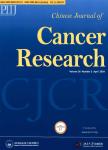Phosphoglucose isomerase gene expression as a prognostic biomarker of gastric cancer
Phosphoglucose isomerase gene expression as a prognostic biomarker of gastric cancer作者机构:Key Laboratory of RNA BiologyInstitute of BiophysicsChinese Academy of SciencesBeijing 100101China University of Chinese Academy of SciencesBeijing 100049China Key Laboratory of Carcinogenesis and Translational Research(Ministry of Education/Beijing)Division of Gastrointestinal Cancer Translational Research LaboratoryPeking University Cancer Hospital&InstituteBeijing 100142China Guangdong Geneway Decoding Bio-Tech Co.LtdFoshan 528316China Centre for Cognitive Machines and Computational Health(CMaCH)School of Electronic Information and Electrical EngineeringShanghai Jiao Tong UniversityShanghai 200240China Department of Computer Science and EngineeringThe Chinese University of Hong KongHong Kong 999077China
出 版 物:《Chinese Journal of Cancer Research》 (中国癌症研究(英文版))
年 卷 期:2019年第31卷第5期
页 面:771-784页
核心收录:
学科分类:1002[医学-临床医学] 100214[医学-肿瘤学] 10[医学]
基 金:supported by grants from the Ministry of Science and Technology of the People’s Republic of China (No. SS2014AA020603) Beijing Municipal Administration of Hospitals Clinical Medicine Development of Special Funding Support (No. ZYLX201701) Beijing Municipal Science and Technology Commission (No. D1311 00005313010) the National Natural Science Foundation of China (No. 31520103905) the National High Technology Research and Development Program (“863” Program) of China (No. 2015AA020108) the Zhi-Yuan chair professorship start-up grant WF220103010 from Shanghai Jiao Tong University
主 题:Gastric cancer gene expression profile prognostic biomarker phosphoglucose isomerase tumor metabolism
摘 要:Objective: Tumor heterogeneity renders identification of suitable biomarkers of gastric cancer(GC)challenging. Here, we aimed to identify prognostic genes of GC using computational analysis.Methods: We first used microarray technology to profile gene expression of GC and paired nontumor tissues from 198 patients. Based on these profiles and patients’ clinical information, we next identified prognostic genes using novel computational approaches. Phosphoglucose isomerase, also known as glucose-6-phosphate isomerase(GPI), which ranked first among 27 candidate genes, was further investigated by a new analytical tool namely enviro-geno-pheno-state(E-GPS) analysis. Suitability of GPI as a prognostic marker, and its relationship with physiological processes such as metabolism, epithelial-mesenchymal transition(EMT), as well as drug sensitivity were evaluated using both our own and independent public datasets.Results: We found that higher expression of GPI in GC correlated with prolonged survival of patients.Particularly, a combination of CDH2 and GPI expression effectively stratified the outcomes of patients with TNM stage Ⅱ/Ⅲ. Down-regulation of GPI in tumor tissues correlated well with depressed glucose metabolism and fatty acid synthesis, as well as enhanced fatty acid oxidation and creatine metabolism, indicating that GPI represents a suitable marker for increased probability of EMT in GC cells.Conclusions: Our findings strongly suggest that GPI acts as a novel biomarker candidate for GC prognosis,allowing greatly enhanced clinical management of GC patients. The potential metabolic rewiring correlated with GPI also provides new insights into studying the relationship between cancer metabolism and patient survival.



